International Mother Language Day
| International Mother Language Day | |
|---|---|
| Official name | International Mother Language Day |
| Significance | Promotes the preservation and protection of all languages |
| Date | 21 February |
| Next time | 21 February 2019 |
| Frequency | Annual |
International Mother Language Day (IMLD) is a worldwide annual observance held on 21 February to promote awareness of linguistic and cultural diversity and promote multilingualism. First announced by UNESCO on 17 November 1999, it was formally recognized by the United Nations General Assembly in a resolution establishing 2008 as the International Year of Languages.[1][2][3]
History
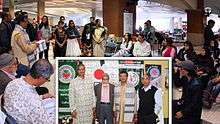
International Mother Language Day has been observed annually since 2000[4] to promote peace and multilingualism around the world and to protect all mother languages. It is observed on February 21 to recognize the 1952 Bengali Language Movement in Bangladesh.
The day was proclaimed by the General Conference of the United Nations Educational, Scientific and Cultural Organization (UNESCO) in November 1999 (30C/62). In its resolution A/RES/61/266, the United Nations General Assembly called on its member states "to promote the preservation and protection of all languages used by people of the world" on 16 May 2009.[5] In the resolution, the General Assembly proclaimed 2008 as the International Year of Languages to promote unity in diversity and international understanding through multilingualism and multiculturalism. The resolution was suggested by Rafiqul Islam, a Bengali living in Vancouver, Canada. He wrote a letter to Kofi Annan on 9 January 1998 asking him to take a step for saving the world's languages from extinction by declaring an International Mother Language Day. Rafiq proposed the date as 21 February to commemorate the 1952 killings in Dhaka during the Language Movement.
Languages are the most powerful instruments of preserving and developing our tangible and intangible heritage. All moves to promote the dissemination of mother tongues will serve not only to encourage linguistic diversity and multilingual education but also to develop fuller awareness of linguistic and cultural traditions throughout the world and to inspire solidarity based on understanding, tolerance and dialogue.
Timeline
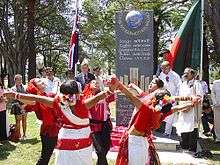
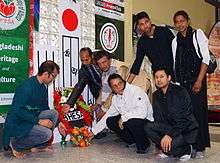
- 1952: Bengali Language Movement
- 1999: UNESCO proclaims 21 February (Ekushey February) as International Mother Language Day
- 2000: Inaugural celebration of International Mother Language Day
- 2002: Linguistic-diversity theme, featuring 3,000 endangered languages (motto: In the galaxy of languages, every word is a star.)
- 2004: Children-learning theme; the UNESCO observance included "a unique exhibition of children’s exercise books from around the world illustrating the process by which children learn and master the use of written literacy skills in the classroom".[7]
- 2005: Braille and sign languages
- 2006: Languages and cyberspace
- 2007: Multilingual education
- 2008: International Year of Languages
- 2010: International Year for the Rapprochement of Cultures
- 2011: Information and communication technologies
- 2012: Mother-tongue instruction and inclusive education
- 2013: Books for mother-tongue education
- 2014: Local languages for global citizenship: spotlight on science
- 2015: Inclusion in and through education: language counts (with an event in Paris)[8]
- 2016: Quality education, language(s) of instruction and learning outcomes
- 2017: Sustainable futures through multilingual education
- 2018: Our languages, our assets.
Observances
UNESCO chooses a theme for each International Mother Language Day, and sponsors related events at its Paris headquarters. In 2008, the International Year of Languages began on International Mother Language Day. It is celebrated in Chile, Russia, the Philippines, Egypt and Canada.[9]
Bangladesh
Bangladeshis celebrate International Mother Language Day by placing flowers at the Martyrs' Monument and its replicas.[10] A public holiday in the country since 1953,[11] it is also known as Shohid Dibôsh (Martyr Day). On 17 November 1999, the UNESCO General Conference recognized 21 February as International Mother Language Day.[12] Bangladeshis organize social gatherings honoring their language and culture, hold literary competitions, draw alpana on the roads, eat festive meals and listen to songs.[10][13]
Canada
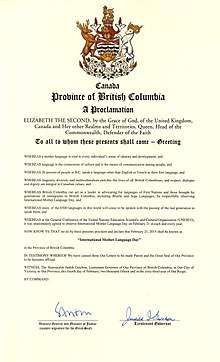
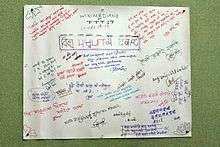
International Mother Language Day was introduced to the Canadian Parliament for recognition by Matthew Kellway on February 5, 2014 as a private member's bill, C-573.[14][15]
In 2015, British Columbia and Manitoba issued proclamations observing International Mother Language Day on 21 February.[16] Edmonton observed International Mother Language Day on February 21, 2017.[17]
India
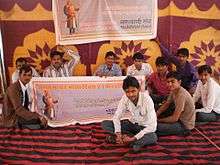
As part of Prime Minister Narendra Modi's Digital India initiative, digitized content will be made available in the country's 22 scheduled languages and extended to India's other 234 recognized languages. Digitization began in June 2016 through the Bharatavani Project at the Central Institute of Indian Languages in Mysore, and by February 2017 content in 60 Indian languages had been made available free of charge.[18][19][20]
Awards
Linguapax Prize
The Linguapax Prize is awarded annually on IMLD by the Linguapax Institute in Barcelona. The prize recognizes outstanding achievement in the preservation of linguistic diversity, the revitalization of linguistic communities and the promotion of multilingualism.[21]
Ekushey Heritage Award

The annual Ekushey Heritage Award, introduced in 2014 by the Bangladesh Heritage and Ethnic Society of Alberta (BHESA), recognizes outstanding achievement in fields such as education, social work, and community service. The award is announced on International Mother Language Day.[22][23][17]
Ekushey Youth Award
The Ekushey Youth Award, introduced in 2015 by Alberta's Mahinur Jahid Memorial Foundation (MJMF) and announced on IMLD, is awarded annually to recipients who inspire youth in the fields of education, sports, youth activities, literature, and community service. The award is open Alberta residents.[24]
See also
References
- ↑ "Links to documents". Un.org. 2002-09-09. Retrieved 2016-07-02.
- ↑ Ingles. Cuerpo de Maestros. Temario Para la Preparacion de Oposiciones .e-book,. MAD-Eduforma. pp. 97–. ISBN 978-84-665-6253-9.
- ↑ Rahim, Abdur (19 September 2014). Canadian Immigration and South Asian Immigrants. Xlibris Corporation. pp. 102–. ISBN 978-1-4990-5874-1.
- ↑ "International Mother Language Day". Retrieved 20 November 2017.
- ↑ "Resolution adopted by the General Assembly" (PDF). Retrieved 21 February 2015.
- ↑ "International Mother Language Day". United Nations. Retrieved 21 February 2013.
- ↑ "Languages in Education | Education | United Nations Educational, Scientific and Cultural Organization". Portal.unesco.org. Retrieved 2016-07-02.
- ↑ "International Mother Language Day Celebration 2015". Retrieved 21 February 2015.
- ↑ City TV, Diverse-City 02.25.14, YouTube, February 25, 2014, Retrieved 2015-05-07.
- 1 2 Riya Karin & Shoha Islam, "Journey to Inclusion in & through Education: Language Counts", Bangladesh PressClub Centre of Alberta (BPCA), Published February 20, 2015 in the Mother Language Magazine 2015 (Page 31), Retrieved 2015-05-06.
- ↑ Professor Kabir Choudhury, "21st February: International Mother Language Day", Bangladesh PressClub Centre of Alberta (BPCA), Published February 20, 2015 in the Mother Language Magazine 2015 (Page 34), Retrieved 2015-05-07.
- ↑ "International Mother Language Day". Un.org. 2007-05-16. Retrieved 2016-07-02.
- ↑ Jonathan and Prithwi Raj, Ekushe February (instrumental), YouTube, February 21, 2012, Retrieved 2015-05-06.
- ↑ "International Mother Language Day Act". Retrieved November 21, 2017.
- ↑ "Bill C-573 (Historical)". Openparliament.ca. 2014-02-05. Retrieved 2016-07-02.
- ↑ "iPage". Motherlanguageday.ca. Retrieved 2016-07-02.
- 1 2 "Int'l Mother Language Day observed at Edmonton". Retrieved November 21, 2017.
- ↑ "भारतवाणी". भारतवाणी. Retrieved 2017-02-20.
- ↑ "International Mother Language Day: India to protect and promote 22 scheduled Indian languages through digitization of content". Merinews.com. 2016-02-21. Retrieved 2016-07-02.
- ↑ "22 Indian scheduled languages to go digital on International Mother Language Day on Feb 21 | Latest News & Updates at Daily News & Analysis". Dnaindia.com. 2016-02-01. Retrieved 2016-07-02.
- ↑ "Inici - Linguapax Internacional". Linguapax.net. 2016-04-28. Retrieved 2016-07-02.
- ↑ "Bangladesh Heritage and Ethnic Society of Alberta". Bhesa.ca. Retrieved 2016-07-02.
- ↑ "International Mother Language Day observed at Edmonton, Canada". Bangladesh Sangbad Sangstha. 28 February 2017.
- ↑ "Mahinur Jahid Memorial Foundation (MJMF) - Ekushey Youth Awards". MJMF.org. Retrieved 2016-07-02.
External links
- UNESCO homepage for International Mother Language Day
- UNESCO Education (includes links to information on past IMLD observances)
- The Makers of History: International Mother Language Day
- Worldwide event calendar on Mother Language Day celebrations
- Information about International Mother Language Day
- The Birth, Death and Re-birth of Language [International Mother Language Day]